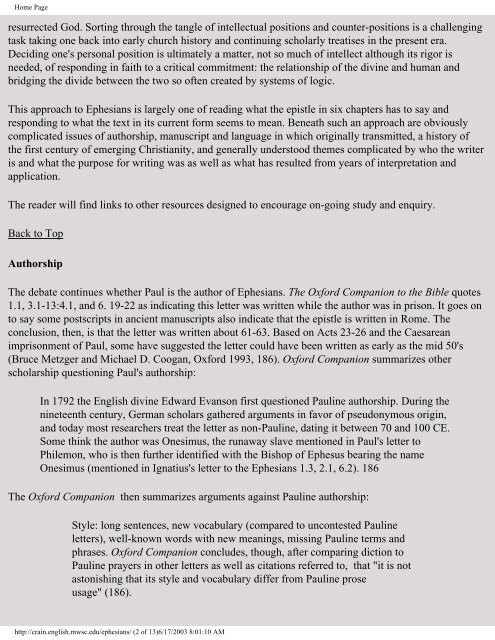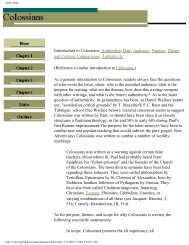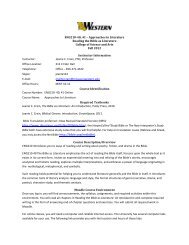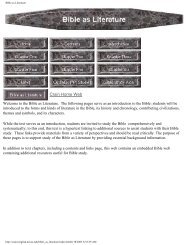Ephesians - Crain Home
Ephesians - Crain Home
Ephesians - Crain Home
Create successful ePaper yourself
Turn your PDF publications into a flip-book with our unique Google optimized e-Paper software.
<strong>Home</strong> Page<br />
resurrected God. Sorting through the tangle of intellectual positions and counter-positions is a challenging<br />
task taking one back into early church history and continuing scholarly treatises in the present era.<br />
Deciding one's personal position is ultimately a matter, not so much of intellect although its rigor is<br />
needed, of responding in faith to a critical commitment: the relationship of the divine and human and<br />
bridging the divide between the two so often created by systems of logic.<br />
This approach to <strong>Ephesians</strong> is largely one of reading what the epistle in six chapters has to say and<br />
responding to what the text in its current form seems to mean. Beneath such an approach are obviously<br />
complicated issues of authorship, manuscript and language in which originally transmitted, a history of<br />
the first century of emerging Christianity, and generally understood themes complicated by who the writer<br />
is and what the purpose for writing was as well as what has resulted from years of interpretation and<br />
application.<br />
The reader will find links to other resources designed to encourage on-going study and enquiry.<br />
Back to Top<br />
Authorship<br />
The debate continues whether Paul is the author of <strong>Ephesians</strong>. The Oxford Companion to the Bible quotes<br />
1.1, 3.1-13:4.1, and 6. 19-22 as indicating this letter was written while the author was in prison. It goes on<br />
to say some postscripts in ancient manuscripts also indicate that the epistle is written in Rome. The<br />
conclusion, then, is that the letter was written about 61-63. Based on Acts 23-26 and the Caesarean<br />
imprisonment of Paul, some have suggested the letter could have been written as early as the mid 50's<br />
(Bruce Metzger and Michael D. Coogan, Oxford 1993, 186). Oxford Companion summarizes other<br />
scholarship questioning Paul's authorship:<br />
In 1792 the English divine Edward Evanson first questioned Pauline authorship. During the<br />
nineteenth century, German scholars gathered arguments in favor of pseudonymous origin,<br />
and today most researchers treat the letter as non-Pauline, dating it between 70 and 100 CE.<br />
Some think the author was Onesimus, the runaway slave mentioned in Paul's letter to<br />
Philemon, who is then further identified with the Bishop of Ephesus bearing the name<br />
Onesimus (mentioned in Ignatius's letter to the <strong>Ephesians</strong> 1.3, 2.1, 6.2). 186<br />
The Oxford Companion then summarizes arguments against Pauline authorship:<br />
Style: long sentences, new vocabulary (compared to uncontested Pauline<br />
letters), well-known words with new meanings, missing Pauline terms and<br />
phrases. Oxford Companion concludes, though, after comparing diction to<br />
Pauline prayers in other letters as well as citations referred to, that "it is not<br />
astonishing that its style and vocabulary differ from Pauline prose<br />
usage" (186).<br />
http://crain.english.mwsc.edu/ephesians/ (2 of 13)6/17/2003 8:01:10 AM






![[38cb1273][0][sourcelist][1][0] - Crain Home](https://img.yumpu.com/2168350/1/190x245/38cb12730sourcelist10-crain-home.jpg?quality=85)